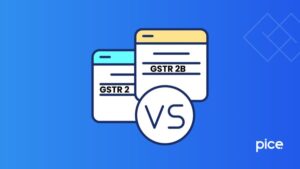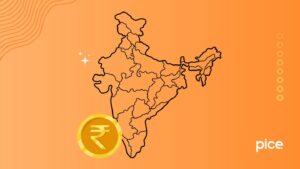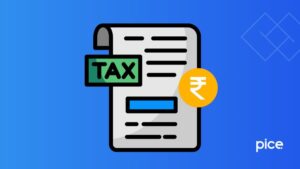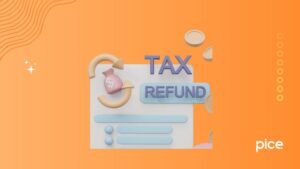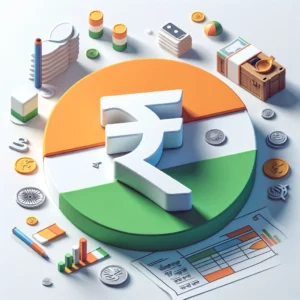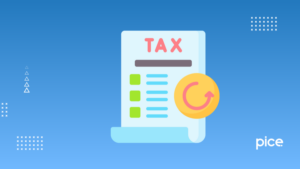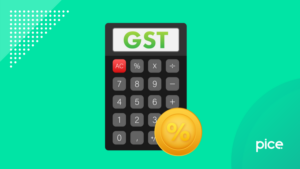Penalty Under Section 74 of GST
- 29 Jan 25
- 14 mins
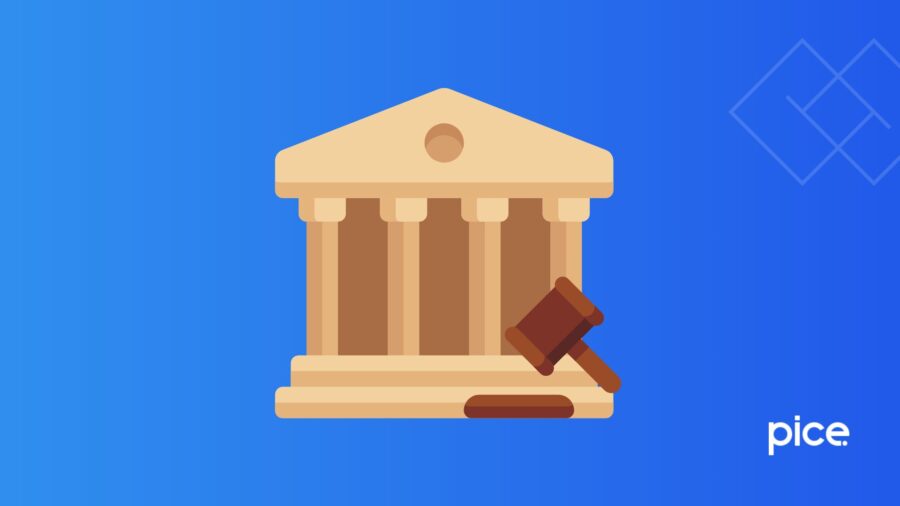
Penalty Under Section 74 of GST
- About the Voluntary Payment Under Section 74
- Procedure for the Voluntary Payment with Form GST DRC-03
- Voluntary Payment Before the SCN Is Issued: Penalty Benefits
- Tax Liabilities Applicable Under Section 74
- Penalties and Interest Applicable Under Section 74
- Show Cause Notice (SCN) Under Section 74
- Consequences of Non-Payment Under Section 74
- Common Defences Recorded Against Section 74 SCN
- Conclusion
Key Takeaways
- Section 74 allows voluntary payment of taxes to avoid tax evasion penalties.
- Voluntary payment before SCN reduces penalties to 15% of the tax amount.
- Form GST DRC-03 is required for voluntary payment through the GST portal.
- Failure to pay can lead to severe penalties and legal consequences.
- Defenses like clerical errors or misinterpretation can be used against an SCN.
The GST, or Goods and Services Tax, system played a major role in revolutionizing India's tax collection procedure in 2017. It led to the simplification and the unification of our country's complex tax collection structure. The GST substituted several other indirect taxes as one indirect tax levied on goods and supplies.
In the framework of this system, Section 74 of the Central Goods and Services Tax (CGST) Act contributes crucially in the case of addressing tax evasion cases. This Section 74 under the CGST particularly deals with cases of fraud, factual suppression with a planned intention of evading tax, or wilful misstatement of essential records.
It underlines the procedures and methods in which tax liability is determined, how penalties are to be imposed, and when voluntary payment is valid under such circumstances.
The concept of voluntary payment under Section 74 is highly significant as it provides the concerned person chargeable with tax the opportunity to fix their errors, avoid legal action against them, and even get reduced penalties. Besides benefiting the taxpayers, this method also helps out the government, promoting compliance and preventing administrative burdens to some extent.
Read this blog for a comprehensive understanding of voluntary payments and penalties under Section 74 of the GST Act.
About the Voluntary Payment Under Section 74
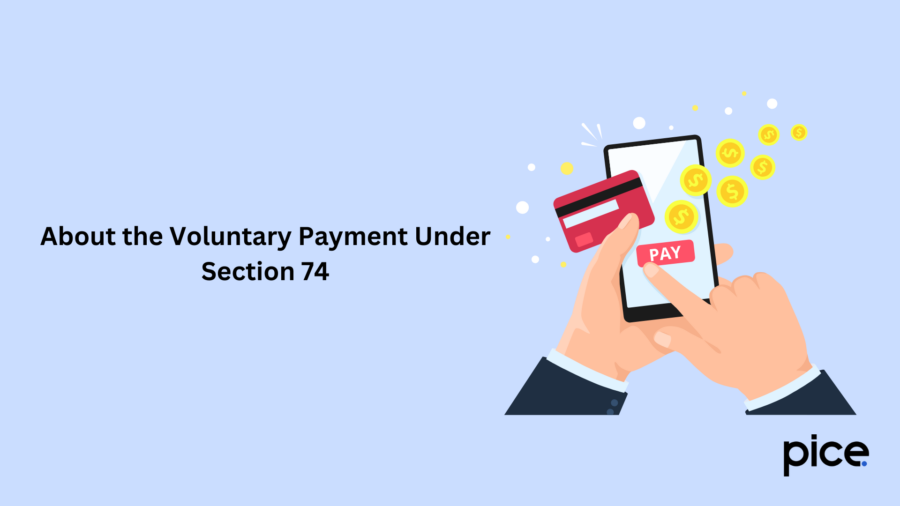
Before diving into more about voluntary payment under Section 74, let us provide some context. There are certain powers that have been bestowed upon appropriate GST officers if there is reason for suspicion of tax evasion.
Under Section 74, the proper officer is empowered to:
● Adjudicate within a limit of 5 years, starting from the year in which the discrepancies were first identified.
● Issue Show Cause Notice (SCN) demanding for the tax unpaid, short-paid, or extra credit claimed.
● Charge interest on tax amount that was unpaid, short-paid, or if extra credit was claimed, alongside a penalty of 15%/25%/50% of the due tax amount/extra credit claimed. The penalty rate depends upon the timeframe within which a person clears the tax demand.
Voluntary payment categorised under Section 74 lets a taxable person pay their due tax, interest, as well as a reduced form of penalty within 30 days of receiving the "Show Cause Notice" (SCN) or before the issue of notice. Such a provision allows the taxpayers to proactively correct their mistakes and omissions that may have led to misstatements or fraudulent results. This reduces the possibility of incurring extensive legal complications.
Here are some of the benefits of opting for voluntary payment under Section 74:
● Lesser Fines & Penalties: By going for voluntary payment before the SCN is issued, payment obligations are significantly reduced compared to penalties charged after the SCN.
● Avoid Legal Consequences: Voluntary payment shall help prevent legal actions from being taken. This minimises potential penalties from piling up and the resulting risk of prosecution.
For your clearer understanding, consider the example of a business that may have realised later that they have under-reported their taxable sales. They can refer to this provision in order to get out of the legal chaos that’s likely to result by voluntarily paying any due tax alongside interest. By proactively taking this step before the SCN, the company can reduce penalties and avoid the legal chaos altogether.
Procedure for the Voluntary Payment with Form GST DRC-03
Taxpayers are required to prepare the form GST DRC-03 in order to make the voluntary payment under Section 74. One can access this form on the GST portal. It shall allow a taxpayer to voluntarily declare and pay off their tax liabilities. They can proceed to use the GST DRC-03 Form for self-assessment of possible discrepancies, adjudication orders, establishing of post-auditing findings, or inspection of outcomes.
Follow this step-by-step guide to filing the Form GST DRC-03:
Step 1: Log into the GST portal by entering your correct credentials (www.gst.gov.in).
Step 2: Scroll over to the tab that reads ‘Services‘ and proceed to select ‘Payment‘.
Step 3: Click on ‘Create Challan‘.
Step 4: Choose the ‘Voluntary Payment (DRC-03)‘ as the reason for payment.
Step 5: Choose the appropriate Act (CGST/IGST/SGST). Fill in the prompted details.
Step 6: Put in the appropriate tax amount, interest and applicable penalty.
Step 7: Opt for your preferred payment method and swiftly finish up with the payment process.
Step 8: Once payment is successfully completed, the DRC-03 challan shall get auto-generated.
Please note that it's of utmost importance that a taxpayer files Form GST DRC-03 within the stipulated time period in order to avail of the benefits of voluntary payment under Section 74.
Voluntary Payment Before the SCN Is Issued: Penalty Benefits
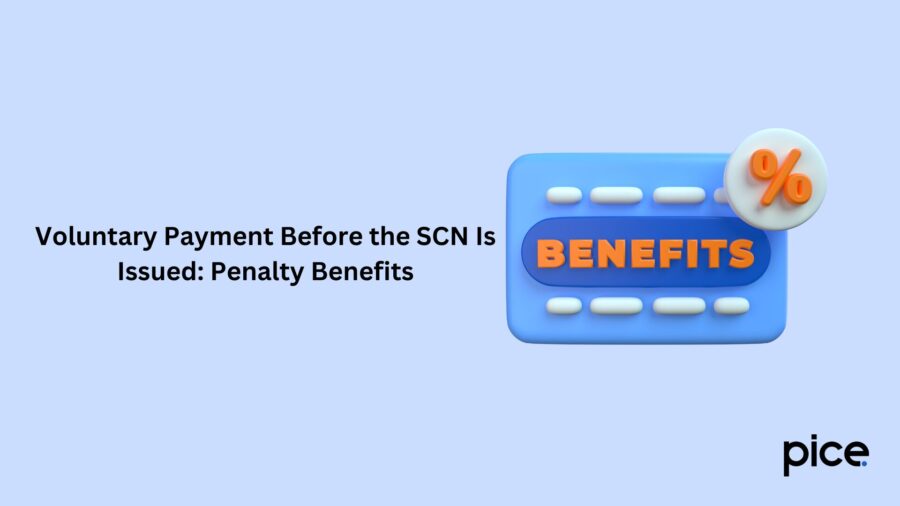
Here are the benefits of opting for voluntary payment before the SCN is issued, discussed in more detail:
● Steering Clear of Legal Proceedings: Voluntary payment makes altogether avoiding the issuance of an SCN. This indicates that the taxpayer is rescued from being stuck with lengthy legal proceedings and potential harm to their reputation. They get to avoid prosecution, litigation, as well as SCN proceedings.
● Reduction of Penalties: If a taxpayer decides to voluntarily make the required payment before they receive an SCN, the penalty percentage is reduced to 15% of the total tax amount. This is comparatively much lower than the possible 100% penalty imposed under circumstances that escalate through adjudication. Consider an example.
Say, a taxpayer has managed to evade ₹1,00,000 in GST; the resulting penalty under typical circumstances could amount to as high as ₹1,00,000. However, if the taxpayer assumes a proactive stance by making the voluntary payment before SCN, the penalty amount drops to ₹15,000, reflecting significant savings in the process.
● Better Compliance Ratings: If taxpayers make voluntary payments under Section 74 before the issuance of SCN, it can improve their compliance ratings.
● Avoidance of Anxiety & Stress: Voluntary payment can help taxpayers rectify their mistakes before they receive the SCN. This shall help them avoid the anxieties of going through SCN proceedings or being prosecuted for offences.
Tax Liabilities Applicable Under Section 74
Tax liabilities applicable under Section 74 include the short-paid or unpaid tax, alongside the interest accumulated (starting off from the due date of payment; up until the actual date of payment). Typically, the interest rate is 18% per annum.
If one chooses to make a voluntary payment, the tax liability shall be calculated in the following manner:
Unpaid/Short-paid Tax + Reduced Penalty + Interest = Tax Liability
Consider the following example for a more comprehensive understanding:
If the taxpayer has orchestrated the evasion of tax amount of ₹1,00,000 in GST over a single year, here’s a calculation proving how voluntary payment can reduce the financial burden on the concerned taxpayer:
● Tax amount: ₹1,00,000
● Interest (18%): ₹18,000
● Reduced penalty (15% of tax amount) = ₹15,000
● Total liability: ₹1,33,000
Penalties and Interest Applicable Under Section 74
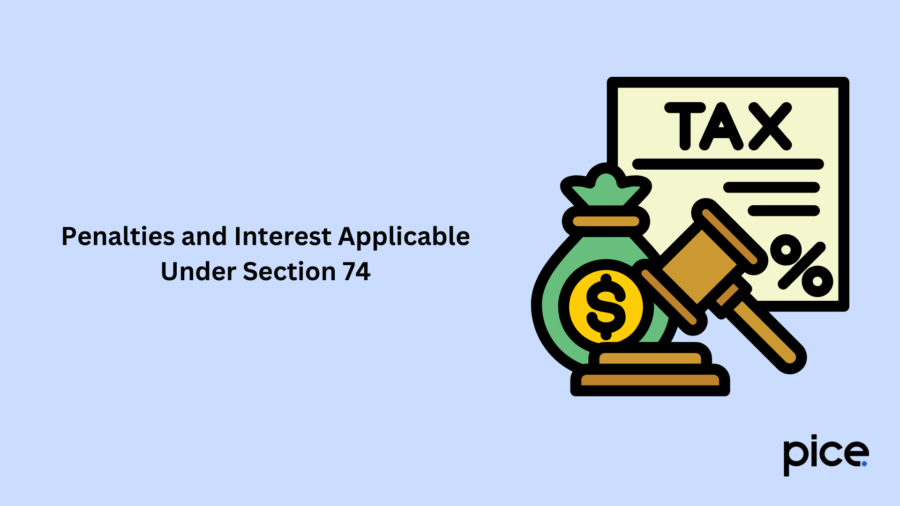
Penalties applicable under Section 74 are decided upon, with an aim to encourage voluntary compliance and discourage tax evasion in the first place. Understand the penalty structure by referring to the table below:
| Tax Percentage | Circumstances |
| 15% of the total tax amount | If a taxpayer pays prior to the issuance of SCN |
| 25% of the total tax amount | If a taxpayer pays within 30 days of the issuance of SCN |
| 50% of the total tax amount | If a taxpayer pays after 30 days of SCN issuance; but prior to the issuance of an order |
| 100% of the total tax amount | If a taxpayer pays after the issuance of an order |
The interest rate is 18% per annum, starting from the due date of payment up until the real date of payment. This stays relevant regardless of when one makes the payment.
According to the table, if a taxpayer evades ₹1,00,000 in GST:
● Penalty applicable if they voluntarily pay before SCN: ₹15,000
● Penalty applicable if they voluntarily pay within 30 days of SCN: ₹25,000
● Penalty charged if they voluntarily pay after 30 days of SCN; before order: ₹50,000
● Penalty charged if they pay after order: ₹1,00,000
Such a progressive penalty structure encourages early voluntary payment on the taxpayer’s end.
Show Cause Notice (SCN) Under Section 74
The Show Cause Notice (SCN) is issued by tax authorities. It is essentially a formal document issued when the authorities suspect that a taxpayer has evidently evaded tax. Whether done via fraudulent activities, suppression of facts, or willful misstatements, the issuance of SCN remains a legal requirement.
The SCN primarily states the alleged violation on the taxpayer’s end and provides adequate opportunity for them to extend an explanation. In case the concerned individual fails to justify their violation, a penalty will be imposed and legal proceedings will be initiated.
The Show Cause Notice outlines the following:
- Alleged tax evasion and the quantum
- The basis upon which the tax amount is arrived at
- The possible penalty payable and interest that shall apply
- The time period within which a taxpayer is required to reply
The taxpayer usually gets 30 days to respond to the SCN. They can choose to make voluntary payments and reduce the penalty or challenge the allegations made.
Consider the example of a clothing retailer. He may have received an SCN for allegedly underreporting his sales to evade GST. He then gets 30 days to either voluntarily make a payment to settle the matter (reduced penalty) or present strong evidence making a case against the allegation.
Next, learn when a SCN can be raised:
- Suspicion of Fraud: The CGST Act has not clearly defined 'fraud'. But it can be legally defined as a part of an 'act of deceit' as per Section 17 of the Contract Act. Fraud takes place when an individual submits documents claiming their originality and accuracy, knowing that the same is not true.
- Suspicion of Wilful Misstatement: Wilful misstatement may involve the conscious filing of a document or statement in the GST portal that conveys inaccurate information, potentially claiming refunds, input tax credits, or other selfish benefits. However, the matter cannot be established as ‘wilful misstatement’ only because the submitted statements do not contain all the accurate information and facts. But if the intent to evade tax is proven on the taxpayer’s end, it can be declared a wilful misstatement. A GST officer has to prove that the misstatement was premeditated and not unintentional or accidental.
- Suspicion of Wilful Suppression of Facts: Section 74 of the CGST Act, 2017 clearly defines the 'suppression of facts' as the 'non-declaration' of facts or information that the taxable body is legally allowed to declare, state, or submit. This aspect of 'wilful suppression', according to the CGST Act, is intentional or premeditated non-declaration/failure to submit. An unintentional failure or omission to submit, however, cannot be 'considered'suppression of fact'.
Tax demand categorised under Section 74 is subject to nuances and subjectivity around certain definitions. They include the definition of fraud, suppression of fact, and wilful misstatement. This has resulted in unnecessary confusion in regard to the time limit of a demand and order. The GST Council, in its 53rd meeting (22nd June 2024), gathered to address the confusion and offer relief options to the GSTIN holders.
Consequences of Non-Payment Under Section 74
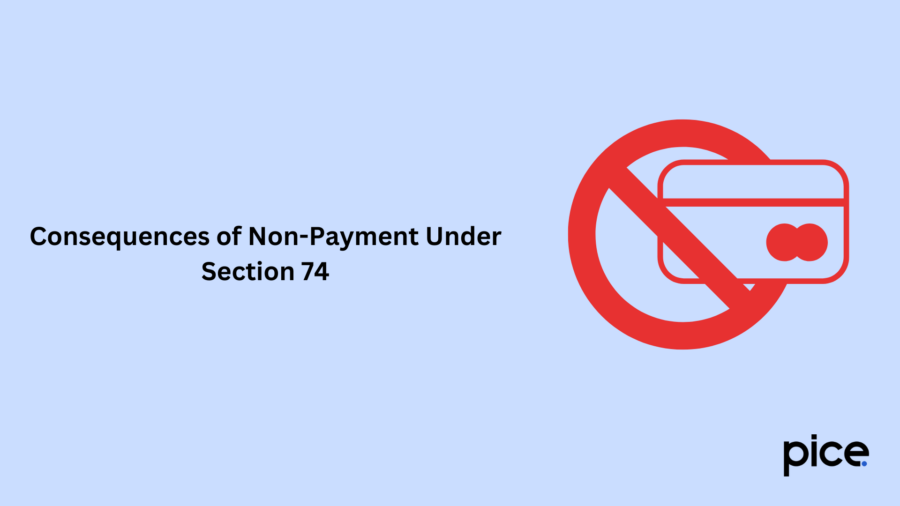
If the taxpayer fails to make the voluntary payment or respond to the SCN under Section 74, the consequences can be severe in such cases. They may lead to:
- Imposition of a high penalty percentage, which may be 100% of the tax amount
- Seizure of bank accounts or assets by authorities in charge
- Termination of GST registration
- Legal prosecution in certain cases
Here’s an example to demonstrate the above:
If a manufacturer is not able to respond to the SCN alleging tax evasion of ₹10,00,000, they are vulnerable to:
● A high penalty amount of ₹10,00,000 (which is 100% of the tax amount)
● The interest rate of 18% per annum on ₹10,00,000
● Freezing of bank accounts
● Seizure of factory equipment (counts as an asset)
● Criminal charges for fraudulent behaviour
Beyond the benefits of voluntary payment under Section 74, the consequences of not doing so or not responding further emphasise the importance of addressing any tax issues as early as possible.
Common Defences Recorded Against Section 74 SCN
Voluntary payment is, in most cases, the common and best course of action. However, there exist circumstances where the taxpayers are able to present valid defences against a Section 74 Show Cause Notice. Some common but valid defences are listed below:
- Clerical Mistakes: Such instances can be highlighted when the alleged tax evasion does genuinely result from clerical errors. In such a case, it cannot be pronounced and charged as would intentional fraud, as the former is a genuine error.
- Misinterpretation of Law: This reason becomes valid if the concerned taxpayer is able to prove that their actions were based upon reasonable misinterpretation of complex tax laws. Again, this can be categorised as a human error.
- Late Notices Forwarded: If the Show Cause Notice is issued 4 years and 6 months later (beyond the set limit, specified in Section 74), it can be refuted.
- Lack of Valid Evidence: If tax authorities are unable to provide concrete evidence of fraud/willful misstatement, the taxpayer shall cite the same as proof of innocence. Lack of evidence shall be a huge obstacle.
Here’s an example that demonstrates the above:
If a company receives an SCN for "misclassification" of their services, they could argue that such classification was, indeed, justified based on a reasonable interpretation of GST laws. Certain GST charges for services, for instance, are often debated.
Conclusion
To summarise, Section 74 under CGST deals with tax evasion while opening up channels of self-correction to taxpayers. They get a reasonable opportunity to voluntarily comply with tax laws by paying within a certain timeframe, only being required to cover reduced penalties.
Individuals also have the option to refute the allegations stated in the SCN with material evidence. However, voluntary payment is the usual response in such cases. Taxpayers get to avoid legal complications altogether.
By opting to make timely voluntary payments and comply with the set GST regulations, taxpayers avoid severe consequences and mental distress in the process. The provision also prompts transparency and efficiency within the elaborate tax system in our country.
💡If you want to streamline your payment and make GST payments, consider using the PICE App. Explore the PICE App today and take your business to new heights.
 By
By 






